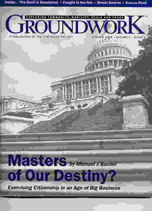Private Entrepreneurship for the Public Good
by David Morris
Institute for Local Self-Reliance
June 30, 1998 – published in St. Paul Pioneer Press
“He is no different from (CBS founder) Bill Paley or Edward R. Murrow in creating the new cyberspace model,” said Eric Schmidt, chief technology officer at Sun Microsystems Inc. “He sees himself as an information entrepreneur and a change agent.”
If you believe Schmidt is talking about Bill Gates, please turn in your modem. The object of Sun Microsystem’s admiration is the far less well-known but far more innovative Carl Malamud, a 39 year old Visiting Professor at the Massachusetts Institute of Technology Media Lab who just a few days ago added yet another victory to his already impressive record of using private entrepreneurialism for the public good.
Malamud came to the internet just as it was converting from text to images, from a small network of military and academic researchers to the mass communications medium we now call the world wide web. In 1993, he established the Washington, D.C.-based non-profit, Internet Multicasting Service(IMS). As David Bank wrote in 1995 in the Denver Post, Malamud “has a vision of an electronic community that includes more than shopping malls and movies. He is trying to construct public places in the electronic world–free concerts, public libraries, open government.” Says Malamud, “there needs to be a public space on the Internet…”
One of Malamud’s first initiatives was to persuade the government to make public information truly public. Washington spends billions of dollars gathering data but has been remarkably reluctant to allow its citizens free access to that information. Thus citizens have to pay twice: once to gather the data and a second time to access it, usually from private companies.
In the mid 1980s the Securities Exchange Commission(SEC) spent almost $80 million to create the electronic EDGAR data base, which contains corporate annual reports, proxy statements and other filings made by nearly 75 percent of the nation’s public companies. In 1993, Malamud asked the SEC to post that data on the web. It refused, partially at the urging of a private information industry that was earning a reported $250 million a year for selling repackaged EDGAR data.
In true entrepreneurial fashion, Malamud ran up a $40,000 debt on his credit card, solicited other contributions and purchased the EDGAR data. In January 1994, over the vigorous objections of the SEC and other government agencies, IMS began to post the full text of SEC documents, several years of patents, the Congressional Record and other public documents on a web site appropriately named www.town.hall.org.
Malamud announced that he would provide the service for 18 months, giving the public a taste of truly accessible public information. Then he would shut it down and urge users to demand that their government assume that responsibility. Eighteen months later almost 20,000 people were using the IMS web site each day. The SEC blinked. Commission Chairman Arthur Levitt Jr. announced, “I think it’s enormously impressive that so many members of the public found this service useful. Because of this, I raised this issue to highest priority at the Commission.” In October 1995, the SEC began to offer its corporate data free. Today the site receives more than 500,000 visits a day.
But the Patent and Trademark Office(PTO) still refused to provide free public access to its public data. This May, after five years of frustration, Malamud issued a challenge. By July 1st, if the PTO still refused to provide that service, IMS would purchase the entire Patent and Trademark database and make it publicly available on the web. Then at the end of the year, “I’ll pull the plug out from the users and give them Al Gore’s e-mail address.”
Bruce Lehman, the Commissioner of the Patent and Trademark Office defiantly responded, “What Malamud wants us to do is permit people to download the entire database. If he can do that we’d be out all $ 20 million we now receive in fees. Why would anyone want paper?”
Malamud insisted that the federal government should not view itself so narrowly. The PTO is not a private corporation seeking to maximize its revenue but is a public corporation whose goal should be to promote the common good. To Malamud, the common good required public access. Making the entire patent database available to any college student with 100 gigabytes of disk storage capacity would touch off an explosion of scientific creativity.
A few days ago, a week before Malamud’s deadline, the PTO gave in. The agency announced that, beginning in August it would post trademark data to the web and beginning early next year, all patent data. Malamud generously announced that he was “thrilled”.
An entrepreneur for the public good. In the age of Bill Gates, I find Carl Malamud delightfully refreshing.



